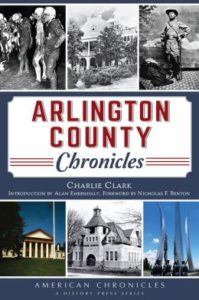 (Update at 12:25 p.m.) Over the years Arlington has been home to numerous eccentric characters and groups. And those local eccentricities have been faithfully chronicled by Charlie Clark, the man who writes the weekly “Our Man in Arlington” column for the Falls Church News-Press.
(Update at 12:25 p.m.) Over the years Arlington has been home to numerous eccentric characters and groups. And those local eccentricities have been faithfully chronicled by Charlie Clark, the man who writes the weekly “Our Man in Arlington” column for the Falls Church News-Press.
Clark peppers his columns with unusual people and Arlington history, and he saved the best 100 columns for his book, he said. Clark will discuss “Arlington County Chronicles,” which was published in April, at Arlington Central Library on Monday, July 7, at 7:00 p.m.
“It’s a little bit of history, public policy, baby boomer nostalgia and neighborhood flavor,” Clark told ARLnow.com. Clark will read from his book at the talk, cherry-picking ones that are “humorous enough in style to bear reading aloud.”
Included in the talk may be some nuggets of local history that attendees were previously unaware of. Readers may be surprised to learn from “Arlington County Chronicles” that:
- At the Arlington Metaphysical Chapel off Wilson Blvd, church-goers hold seances, give tarot readings and read from all manner of religious texts.
- There is a preserved dueling ground at N. Randolph Street and Glebe Road, one which bore witness to the famed 19th century duel between Henry Clay and John Randolph, as well as a few of Clark’s own scraps. “Neither was very violent,” Clark said of his childhood fights. “In both cases, my opponent and I agreed, like duelers, to end it after we’d both stood up to the enemy and saved face.”
- The Doors’ Jim Morrison lived at 2320 N. Evergreen Street in his teen years, and at two other Arlington addresses that Clark gives in the book. “I associate many Arlington sites with the memory of the Doors’ carnivalesque organ,” Clark said in his Morrison essay.
- When Katie Couric interviewed Warren Beatty, a Washington-Lee High School graduate, on The Today Show, she mentioned that she went to Yorktown and he answered: “What’s Yorktown?” Beatty is one of 14 thespians Clark mentions in his essay “Arlingtonians in Hollywood.”
- The two oldest retail businesses currently in Arlington, according to Clark, are both shoe stores. The Public Shoe Store on Wilson Blvd and the Sam Torrey Shoe Service on Lee Highway were established in 1938 and 1945, respectively.
- During the Cold War, Arlington Hall was the hub of a code-breaking operation, where linguists worked to decipher Soviet and Japanese messages for government officials. The operation shut down in 1949 after being infiltrated by Soviet double agents.
- A stand-off between civil rights activist Dion Diamond and American Nazi Party leader George Lincoln Rockwell occurred in 1960 during a lunch counter sit-in at what was then the Cherrydale Drug Fair store. A few days after the protest, Arlington restaurants desegregated, Clark said in his essay. “All you had to do was crossover the Maryland and Northern Virginia line to find de facto segregation,” Diamond, then a Howard University student, told Clark.
- One of Arlington’s wealthiest landowners in the late 1800s may have been the product of a sex scandal, according to Clark’s essay “A Lee Family Scandal.” Nicholas Febrey owned 600 acres of George Washington Forest, in the area of what is now Swanson Middle School. Clark writes that Febrey’s mother, an unwed daughter of a preacher, delivered him as a baby to the wealthy George Washington Parke Custis, who raised him.
Many of the included columns pay homage to the culture of Clark’s parents’ generation, especially his essay about attending “cotillion” dance lessons as an Arlington youth.
“They did a great job of trying to pass their culture on to us, and I feel a little bad that we were so tough to handle,” Clark said. “This is a thank you.”
An additional book talk will be Sunday, July 13 at Cassatt’s.

